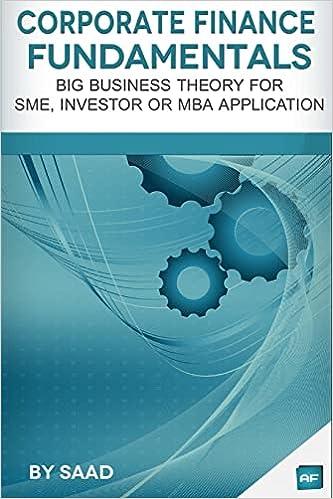Question
Lewis Securities Inc. has decided to acquire a new market data and quotation system for its Richmond home office. The system receives current market prices
Lewis Securities Inc. has decided to acquire a new market data and quotation system for its Richmond home office. The system receives current market prices and other information from several on-line data services, then either displays the information on a screen or stores it for later retrieval by the firms brokers. The system also permits customers to call up current quotes on terminals in the lobby.
The equipment costs $1,000,000, and, if it were purchased, Lewis could obtain a term loan for the full purchase price at a 10 percent interest rate. Although the equipment has a six-year useful life, it is classified as a special-purpose computer, so it falls into the MACRS 3-year class. If the system were purchased, a 4-year maintenance contract could be obtained at a cost of $20,000 per year, payable at the beginning of each year. The equipment would be sold after 4 years, and the best estimate of its residual value at that time is $200,000. However, since real-time display system technology is changing rapidly, the actual residual value is uncertain.
As an alternative to the borrow-and-buy plan, the equipment manufacturer informed Lewis that Consolidated Leasing would be willing to write a 4-year guideline lease on the equipment, including maintenance, for payments of $260,000 at the beginning of each year. Lewiss marginal federal-plus-state tax rate is 40 percent. You have been asked to analyze the lease-versus-purchase decision, and in the process to answer the following questions:
a. 1. Who are the two parties to a lease transaction?
a. 2. What are the five primary types of leases, and what are their characteristics?
a. 3. How are leases classified for tax purposes?
a. 4. What effect does leasing have on a firms balance sheet?
a. 5. What effect does leasing have on a firms capital structure?
b. 1. What is the present value of owning the equipment? (Hint: set up a time line which shows the net cash flows over the period t = 0 to t = 4, and then find the PV of these net cash flows, or the PV cost of owning.)
b. 2. Explain the rationale for the discount rate you used to find the PV.
c. What is Lewiss present value of leasing the equipment? (Hint: again, construct a time line.)
d. What is the net advantage to leasing (NAL)? Does your analysis indicate that Lewis should buy or lease the equipment? Explain.
Step by Step Solution
There are 3 Steps involved in it
Step: 1

Get Instant Access to Expert-Tailored Solutions
See step-by-step solutions with expert insights and AI powered tools for academic success
Step: 2

Step: 3

Ace Your Homework with AI
Get the answers you need in no time with our AI-driven, step-by-step assistance
Get Started


